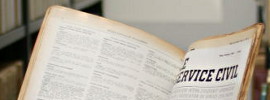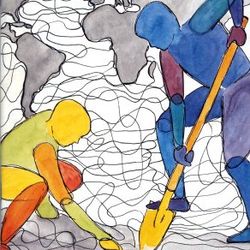Nicholas Cunningham
In 1948, while at Harvard college I yearned to spend a couple of summers buming around Europe, but had no money. My father said OK, if you work for two months, I'll cover your travel for two weeks. Izaline Doll, a French friend of my sister Sarah, told me about the Service Civile Volontaire Internationale (1), an anarchist, pacifist work camp movement founded by a Swiss engineer, Pierre Ceresole. The French branch was headed by a devout anarchist, Etienne Reclus. Meeting Etienne was my first exposure to someone with radical views who absolutely lived by his beliefs. It was told of him that whenever possible, he would walk across fields rather than use the public roads built by the state!
The first summer (1948), when I was 20, I worked on two projects. The first one involved the renovation of a community centre in Bordeaux, where I learned to hang wall paper, and also how to pray. At first, being a non church goer, I resisted the idea of praying in the company of other "civilistes" at a designated time, believing that I should pray any time I felt so moved. However, once I got used to it, I realized two things; 1. that my stance had been what we Americans call a "cop-out" since in reality I rarely felt so moved, and 2. quiet scheduled meditation in the company of sincere others was a discipline that yielded fruit; it allowed for the kind of thoughts that inspired Ceresole and maybe anyone to act in a more conscious way and it, together with the communal labour, fostered a kind of group solidarity.
With the second project I helped build the foundations for an Alpine village for tubercular children. Ceresole believed that if you worked with pick and shovel all day long, any evening conversation was likely to be more meaningful. He was right. An illiterate Algerian revolutionary, Belkacem Larkeche, with scars up both arms, taught me how to fell trees, but also what it cost to be a freedom fighter. I also came to realize that while socializing with stories and music at the end of the day was most enjoyable, getting to know the other volunteers was best accomplished by working along side them.
The second summer, (1949) the SCVI sent me to Roanne, where I joined the "Castors" (Beavers), helping workmen who'd been in forced labour camps during WWII, but on returning home lacked the capital to buy housing. So they organized to build their own housing, and I among other young SCVI voluteers, helped out, making some life long friends in the process. What impressed me in Roanne was the way workmen whose houses got finished first, continued to help the others to finish theirs. The solidarity of working together apparently created bonds strong enough to keep them going. None were masons but one of the men had invented a concrete casting machine capable of making interlocking blocks so consistently that walls could be built without layers of mortar in between, (though mortar was poured in from the top of each wall). However, the men were so eager to get on with the work that they sometimes failed to recalibrate the machine often enough to insure uniformity, so I undertook the job of regularly checking the machine, which made me feel vary important. There were some young German volunteers and while they seemed nice enough, the French families who fed us, couldn't quite bring themselves into inviting the Germans into their homes. I felt uncomfortable accepting their hospitality but came to understand that even though the Germans were too young to have served in the Wehrmacht, the WWII wounds were still too fresh to allow full acceptance. So I got a glimpse of what why Ceresole was such a fervent pacifist. Ceresole didn't believe in writing but did keep a diary and after he died, some of his thoughts were collected in a small book called For Peace and Truth which I read and have reread many times.
I suspect that those experiences drew me 13 years later to leave my coveted neonatal fellowship at Babies Hospital, to volunteer for the Peace Corps, (the first physician to do so). And a generation later, my son Andrew joined 9 Americans, 10 Germans and 10 Russians at an SCVI camp at Remagen, (and led them in an effort to convert the Remagen Bridge Museum from a war to a peace museum), and then years later served with the Peace Corps in Honduras.
My wife, Cathy, a psychiatrist has gotten me interested in the "Intergenerational Transmission of Trauma", but what about the I.T. of Peacework?
Remarks
(1) Service Civil Volontaire International (SCVI) was the name of the French branch of SCI 1950s.



